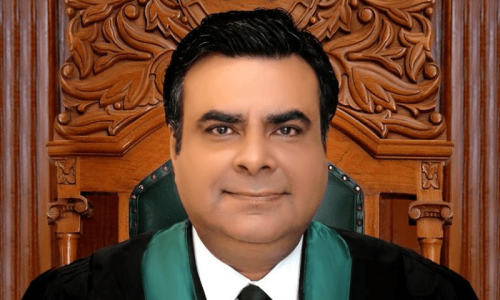HYDERABAD, Oct 26: A noted water technologist Prof (Dr) Mohammad Ahsan Siddiqui of National Centre of Excellence and Analytical Chemistry, Sindh University, has recommended to secretary irrigation department, District Nazim Hyderabad and others to stop releasing contaminated water from the Manchhar Lake into the Indus River as the limits of certain parameters were being crossed.
Siddiqui told Dawn here on Friday that he had sent a formal communication to Sindh secretary irrigation, DCOs of Hyderabad, Jamshoro, district nazim Hyderabad and chief engineer Sukkur Barrage right bank, Atta Soomro, to stop releasing water from the Manchhar Lake to the Indus River at Kotri upstream.
He said that he had to make this recommendation because the recent findings of water analysis at Kotri upstream showed that limits of certain parameters are about to cross and given the fact that there is no sufficient water at Sukkur downstream it is advisable that no more water should be released in the River Indus.
He said the maximum limit of total dissolved salts (TDS) in water was set at 500mg/L and this value is now crossing 400mg/L.
He said that earlier the ratio of 1:50 (means one thousand Manchhar lake’s water should be released when 50,000 cusecs of water is released from Sukkur downstream) was being maintained and since inflows at Kotri up stream was increased the ratio was maintained at 1:20 and then at 1:15.
He said the status of Manchhar Lake had also improved because its water was released to bring the lake’s level to 111.10 RL which is the current level of the lake.
He informed that right now 800 cusecs of water was released from the lake into the River Indus against 13,599 cusecs of water at Sukkur downstream so there is apprehension of contamination in quality of water.
He said that since the MNV’s inflows continued to be discharged into the Manchhar Lake therefore it would not be prudent that lake’s water should be released into the River Indus in absence of rich inflows from Sukkur downstream.
Water and Sanitation Agency (Wasa) lifts water from combined water channel that was supplied water from River Indus upstream and stored it in lagoons.
Subsequently the water was released into filter plant for purification before it is supplied in the city’s three talukas.
The district government had asked Mr Siddiqui to regularly monitor quality of River Indus and Manchhar Lake on four hourly basis, so that any mishap that had taken place in May 2004, resulting in the death of 42 persons in the city should not be repeated.















































Dear visitor, the comments section is undergoing an overhaul and will return soon.